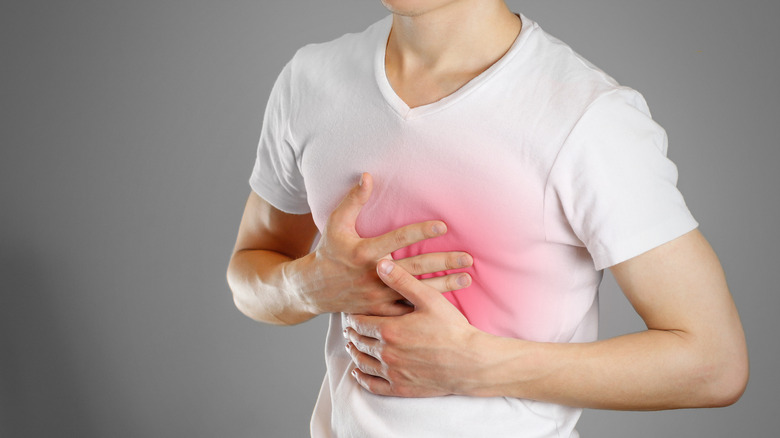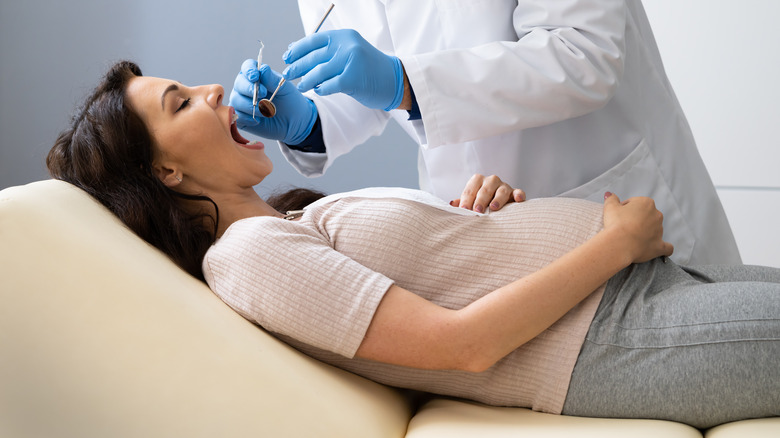What Happens To Your Body When You Have Heartburn
Heartburn is now a common occurrence worldwide. That burning sensation in the stomach, which is often accompanied by belching with a bitter taste, is familiar to many of us. The American College of Gastroenterology notes that most (if not all) of us will experience the condition at some point, which usually happens after a heavy meal.
Heartburn usually results from acid escaping the stomach. When this occurs, stomach acid — which is responsible for killing germs and pathogens from food — rises into the esophagus. When this acid moves through the esophagus, the respective heartburn (or reflux) symptoms appear and may result in discomfort (via MedicalNewsToday).
Various things happen to your body when you experience heartburn. If you frequently suffer from it, it's advisable to see a doctor to rule out gastroesophageal reflux disease (GERD). This is a more severe condition where frequent reflux symptoms happen at least twice a week, per MedicalNewsToday.
How the body reacts during heartburn
When heartburn occurs, common symptoms include burning pain in the chest (mostly after eating), pain when lying or bending, and a sour taste in the mouth. Less common symptoms include a dry cough and hoarseness (via Mayo Clinic).
According to the Cleveland Clinic, a weak or relaxed sphincter (or valve) is one common cause of heartburn. The sphincter is located between the esophagus and the stomach. When functioning optimally, the sphincter prevents acid from entering the esophagus. The clinic further explains that if this muscle relaxes when it shouldn't, stomach acid can flow unhindered in the direction of the esophagus.
In addition to a weak sphincter, increased pressure in the abdomen, lifestyle, eating habits, and medications for blood pressure, asthma, anxiety, and insomnia can also influence the development of heartburn symptoms, as detailed by WebMD. In some other cases, the rising acid is a consequence of other more serious ailments, like esophageal cancer, per Healthline. Other risk factors for reflux disease include smoking — excessive smoking reduces saliva production, resulting in more heartburn symptoms (via WebMD).
Many pregnant women also suffer from heartburn. As explained by the Cleveland Clinic, hormonal changes can lead to a relaxation of the sphincter muscle. The growing embryo in the uterus puts pressure on the stomach, pushing stomach acid into the esophagus.
Diagnosis and treatment options
For your specific health concerns, it's always best to contact your doctor for proper diagnosis and treatment options. In some cases, symptoms can be well managed with lifestyle changes, such as losing weight and drinking less alcohol (via WebMD). Johns Hopkins Medicine also notes that quitting smoking (with the help of a medical professional) might be a good idea.
In other cases, prescription medication may be necessary to reduce the acid content. Acid inhibitors, or proton pump inhibitors (PPI), are commonly prescribed. Over-the-counter drugs from pharmacies either bind gastric acid (antacids) or hinder the new production of gastric acid (H2-receptor antagonists), per the Mayo Clinic.
If symptoms are atypical, an endoscopy may be needed to confirm the diagnosis and rule out disorders, like GERD. Other tests that can diagnose gastroesophageal reflux disease include a biopsy and esophageal manometry, per WebMD. Your doctor can help you decide the best form of treatment for your symptoms.



